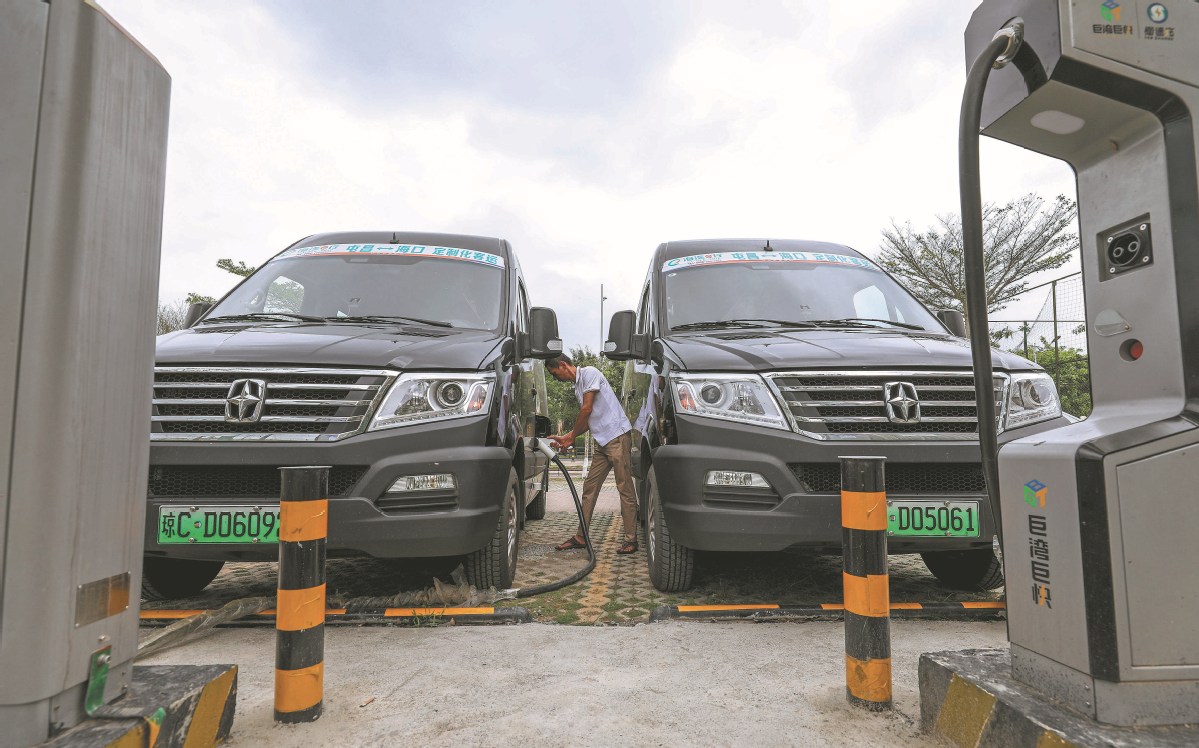Electric vehicle sales gain traction in rural areas

Automakers look to overcome hurdles to expand into new market
Dong Yixuan, a 27-year-old electrical engineer in Beijing, has recently been at odds with her father.
For several months, Dong has been trying to persuade her father, a farmer in Jinzhou, Liaoning province, to replace his four-wheel "elderly scooter" with a car.
Known as lao tou le, or elderly scooters, the three- and four-wheel vehicles covered by cabins are a preferred mode of transportation for older people, which is how they earned the nickname.
Even though Dong offered to pay for a new car, she has not succeeded in changing her father's mind.
"He just won't give in," Dong said, adding that her father argues that the 18,000 yuan ($2,505) scooter meets his transportation needs, as he only rides it around his village, and it will last him for several more years.
However, Dong insists he should buy a car for safety reasons. Although they are tolerated on roads in many parts of the country, the elderly scooters, similar to e-bikes, have no regulatory controls.
The scooters' low-level performance means they are not covered by motor vehicle safety standards and they do not require registration, license plates or insurance.
"I am worried about his safety and the safety of others as well," Dong said. "It is really scary to see people driving these scooters when you don't know whether they are qualified to drive," she added.
Statistics from the Ministry of Public Security show that there were 830,000 traffic accidents involving elderly scooters from 2014 to 2019, which killed 18,000 people and injured 186,000 others.
Last year, 138 people died in 131 traffic accidents involving three- and four-wheel scooters in Beijing.
A number of cities, including Wuhu in Anhui province and Binzhou in Shandong province, have instigated policies to phase out the scooters to improve traffic safety.
Beijing's transport bureau announced in July 2021 and reiterated in April that elderly scooters will be banned from the capital's roads from Jan 1, 2024.
Safety priority
It is natural that authorities are tightening controls on three- and four-wheel scooters, said Wang Du, assistant to the president of the China Auto Dealers Association.
"The most basic requirement for a vehicle model to be on the road is that its safety is certified. Yet almost all of such scooters available on the market are not on the list of models promulgated by the authorities," Wang said.
With similar sizes and prices, small electric vehicles from carmakers like Wuling and Chery are strong alternatives to elderly scooters. However, they require insurance and the driver must be licensed, both of which have dissuaded some potential buyers.
Dong said her father has reluctantly agreed to have a test drive of a Wuling Mini EV, China's most popular mini electric vehicle model. She is hoping he changes his mind after the test drive.
"At least I would be more reassured if he has a real car. After all, he is getting old and I would like to make sure that he is safe," said Dong.
In 2020, China started to promote new energy vehicles, including electric ones and plug-in hybrids, in its rural areas to improve traffic safety, cut carbon emissions and stimulate consumption.
This year's promotional campaign of new energy vehicles in rural areas started last month in three cities: Wuxi, in East China's Jiangsu province; Qionghai, in South China's Hainan province; and Jingzhou, in Central China's Hubei province.
The campaign is scheduled to run till December, according to the Ministry of Industry and Information Technology, one of five government departments that launched the event.
A total of 69 NEV models, small and medium-sized ones, are being offered at discounted prices during this year's campaign.
The Ministry of Industry and Information Technology said over 170 promotional events have been held in rural areas in more than 10 provinces since 2020. At the events, 140 models including sedans, sport utility vehicles, multipurpose vehicles and light trucks from 45 vehicle makers with combined sales of 4.12 million units, have been featured.
"Models involved in the campaign have seen their average sales grow at 10 percentage points higher than the overall NEV market," said Xu Haidong, vice-chief engineer at the China Association of Automobile Manufacturers.
NEVs are now a popular choice among car buyers in China, especially in cities.
Statistics from the China Association of Automobile Manufacturers show that NEVs accounted for 25.6 percent of total vehicle sales in the country in 2022. However, NEV sales in rural areas only made up 4 percent of total sales.
"As China advances its rural vitalization strategy, farmers have seen their living standards improve. Rural areas, with a combined population of over 500 million people, will prove to be a huge market for NEVs," said Xin Guobin, vice-minister of industry and information technology.
There is immense potential for NEVs in the rural market, said Cui Dongshu, secretary-general of the China Passenger Car Association. "It is a huge market and represents a major opportunity for automakers. It will also reshape China's consumption structure and lead to more sustainable consumer spending," he said.

